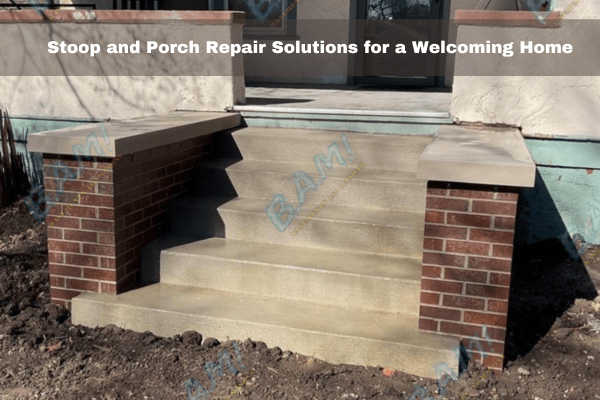Are your front steps sinking, tipping, tilting, settling, or pulling away from your foundation?
Whether it's the entryway to your home or a prominent feature of your outdoor living space, a concrete stoop or porch adds both functionality and aesthetic appeal to your property. Over time, however, these structures can deteriorate due to several factors, including weather exposure, heavy foot traffic, and underlying structural issues. Fortunately, concrete stoop repair and porch restoration techniques can help breathe new life into these elements, enhancing their longevity and preserving their visual appeal. We will look at the common causes of damage to concrete stoops and porches, outline the step-by-step repair process, and provide practical tips to maintain their condition in the long run.
Understanding Common Causes of Stoop Damage
Before diving into the repair process, it is very important to identify the root causes of concrete stoop and porch damage.
Here are some common factors that can contribute to their deterioration:
Weathering and Freeze-Thaw Cycles: Constant exposure to the elements, such as rain, snow, and temperature changes, can lead to cracks and surface degradation.
Settling and Foundation Issues: Uneven settling of the ground beneath the stoop or porch can cause structural problems, including sinking, tilting, or shifting.
Heavy Foot Traffic: High foot traffic areas can experience wear and tear, resulting in surface cracks and erosion.
Poor Construction Techniques: Improper installation, insufficient reinforcement, or inadequate curing can weaken the concrete and make it more prone to damage.
Chemical Damage: Exposure to corrosive substances like deicing salts, oil spills, or cleaning agents can also degrade the concrete's surface.
Dealing with Structural Issues: If settling or foundation problems are detected, consult a professional masonry contractor for a thorough assessment and appropriate remediation measures.
Depending on the severity of the issue, solutions may include Polylifting (lifting the concrete), underpinning (strengthening the foundation), or complete reconstruction.
Why do steps pull away, settle, or sag:
· Brick or stone installed on the sidewalk without the proper footings, without proper footings the sidewalk cannot sustain the weight of the steps.
· Rebar/steel not used in footings to support the steps.
· Soil was poorly compacted and water draining toward the home creating voids.
Why porches/stoops lean away and separate:
· Neither concrete wing supports, or rebar were used in construction, so the footing is unattached.
· Soil was poorly compacted without 95% compaction to prevent shifting and sinking.
· Soft fill dirt was used to backfill or negative slope of water drain-off softened the soil.
· Steps and porches can sometimes be lifted, repositioned, and permanently secured, sometimes by driving steel piers into the bedrock.
Signs you need Stoop or porch repair
Cracks: Observe if there are any visible cracks in the concrete, stone, or brickwork of your stoop or porch.
Unevenness: Walk across your stoop or porch and check if it feels uneven or slopes in certain areas. This can be an indication of foundation issues or structural damage that requires repair.
Loose or deteriorating materials: Inspect the components of your stoop or porch, such as railings, steps, or supports, and see if any of them are loose, rotting, or deteriorating. Damaged materials can compromise the stability and safety of the structure.
Water damage: Look for signs of water damage, such as mold growth, discoloration, or wood rot. Water infiltration can weaken the structure and lead to further damage if left untreated. Also make sure your gutters are not running into the stoop area and it is running away.
Sinking or settling: If you notice that your stoop or porch has sunk or settled unevenly, it could be a sign of soil erosion, poor foundation, or insufficient support. This can cause stability issues and should be addressed promptly.
Wobbling or shaking: When you walk on the stoop or porch, pay attention to any wobbling or shaking sensations. Excessive movement can indicate structural instability and the need for repairs.
Pests or insect infestation: Keep an eye out for signs of pests or insects, such as termites or carpenter ants, which can cause significant damage to the wood or other materials used in your stoop or porch.
Age and general wear: If your stoop or porch are quite old or has not received regular maintenance, it may be prone to deterioration. Aging components may require repair or replacement to ensure the safety and longevity of the structure.
A Front Entrance gives a First Impression of the Home
When front walkways or door stoops settle and separate, visitors may see signs of neglect and question the structure’s safety. In the real estate market, profit and interest may be lost due to added post-sale home improvement expenses for potential buyers.
Contact Us to Discuss your Stoop and Porch Repair Options
Act early and let us save you money by restoring the front entrance to its original appearance and structural safety. Call BAM Basements and Masons today for a free honest estimate and more information on options we provide that can renew your home’s porch for a lifetime.
We would welcome the opportunity to help you with all your Stoop and porch needs. BAM Basements and Masons of Des Moines is your premier masonry company serving the Des Moines, Iowa area. If you’re located in Des Moines, Ankeny, Bondurant, Altoona, Pleasant hill, Ames, Adel, Waukee, Indianola, Grimes, Urbandale, Johnston, West Des Moines, or the surrounding areas, we’re the place to call. We can help you avoid costly and stressful foundation repair mistakes, by giving you a customized solution that’s going to work for you and your home in the long term. BAM Basements and Masons of Des Moines is a professional and locally owned and operated state-registered contractor. Affordable honest upfront pricing, no hidden costs, offer free estimates and limited lifetime warranties.


